Disruption warning as junior doctor strikes return
- Published
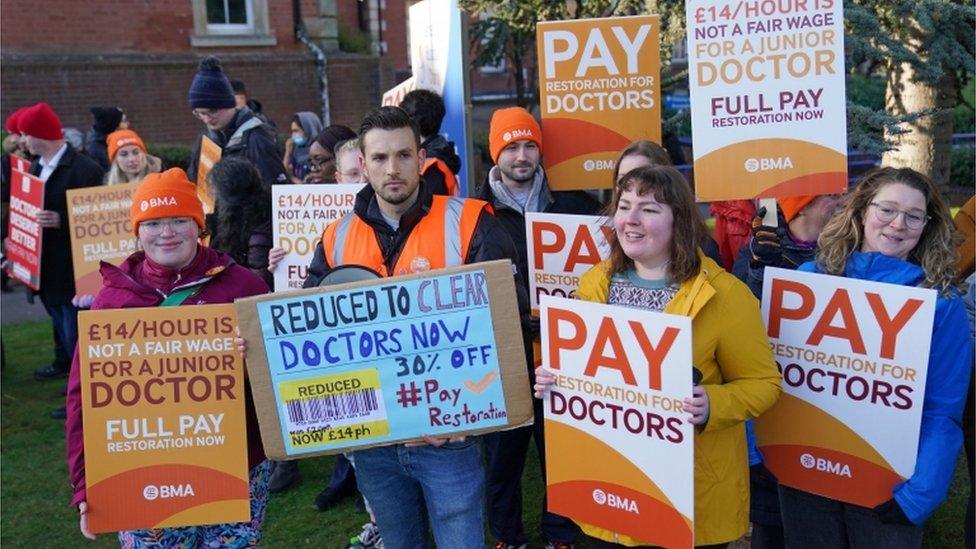
Patients are being warned to expect major disruption in England after junior doctors began their 26th day of strike action in their pay dispute.
The stoppage started at 07:00 and will last three days, with senior doctors drafted in to provide emergency cover.
NHS strike action has seen more than 1.1 million appointments and treatments cancelled in the past year.
This walkout will be followed by a six-day strike at the start of January, the longest in NHS history.
It comes after talks between the British Medical Association (BMA) and government broke down, earlier this month.
NHS England medical director Prof Sir Stephen Powis said the situation was further complicated by the holiday season - in the coming three weeks, only four weekdays in the NHS are unaffected by holidays or industrial action.
"These strikes come at a time that will cause huge disruption to the NHS, with services already feeling the strain of winter pressure," he said.
"Over the holiday period, I would encourage anyone who needs medical help to continue to come forward.
"In a life-threatening emergency, call 999 and use A&E in the usual way. For everything else, use 111 online."
But some A&E services are having to close. Cheltenham A&E, for example, will not open during either junior doctor strike, with emergency care provided by Gloucestershire Royal Hospital, run by the same NHS trust.
Chief medical officer Dr Ananthakrishnan Raghuram said: "This is a very challenging environment - and decisions have not been taken lightly."
The BMA rejected a last-minute plea by five national organisations, including Age UK and the Patients Association, for the strike action to be downgraded to a partial walkout, with some emergency cover provided by junior doctors. Consultants and specialist doctors would provide life-and-limb cover, the union said.
The charities said they were concerned about the risks to elderly patients in particular and warned they could become "stranded" in hospital over the festive period because doctors were too busy covering emergency care to oversee wards.
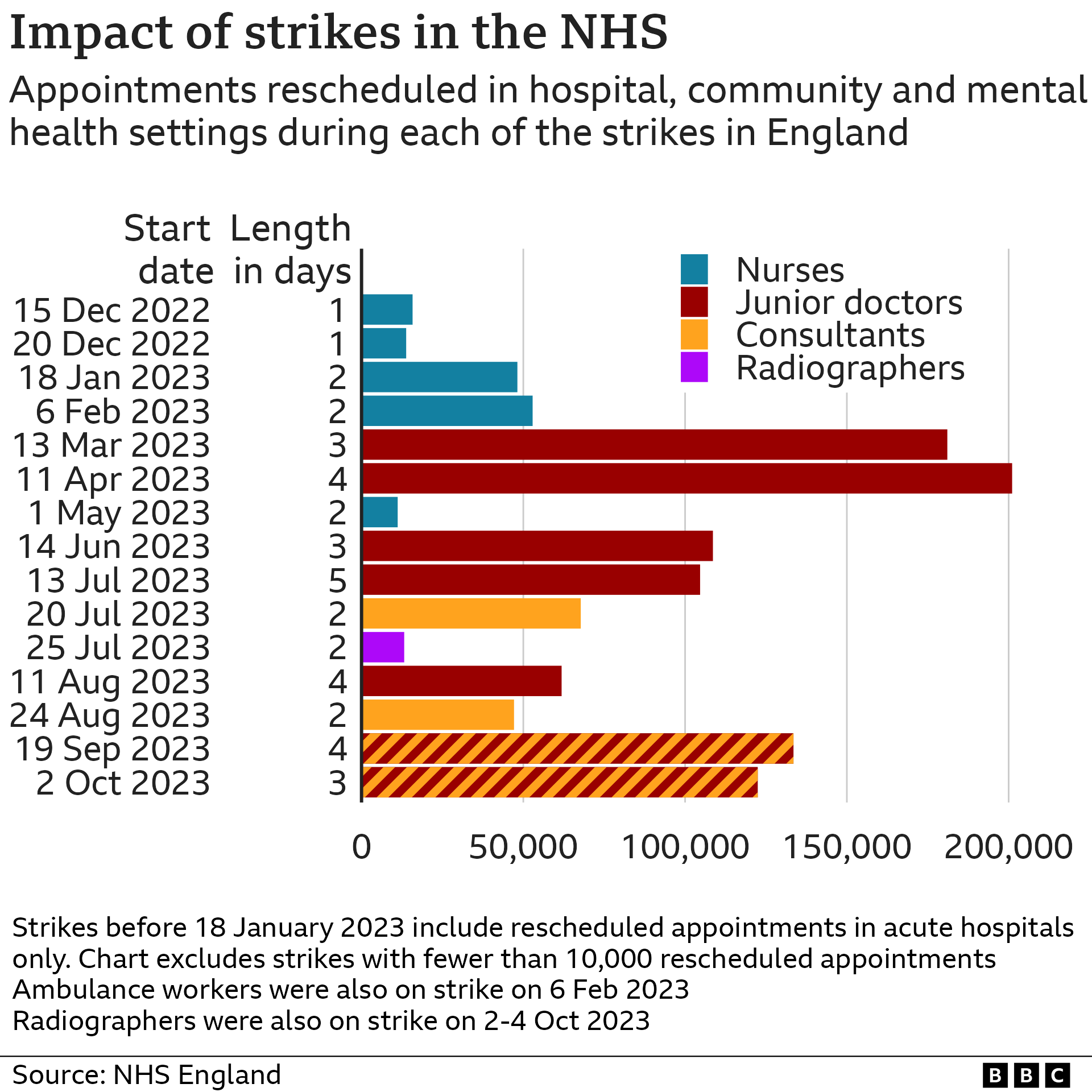
Nearly half of NHS doctors are junior doctors - a group that spans those just out of university through to some who have 10 years or more experience.
Two-thirds are members of the BMA - and they will be joined by members of the much-smaller Hospital Consultants and Specialists Association union.
Hospitals services are expected to be worst affected but there will also be some disruption to GP care.

'I couldn't wait any longer - I paid for care'
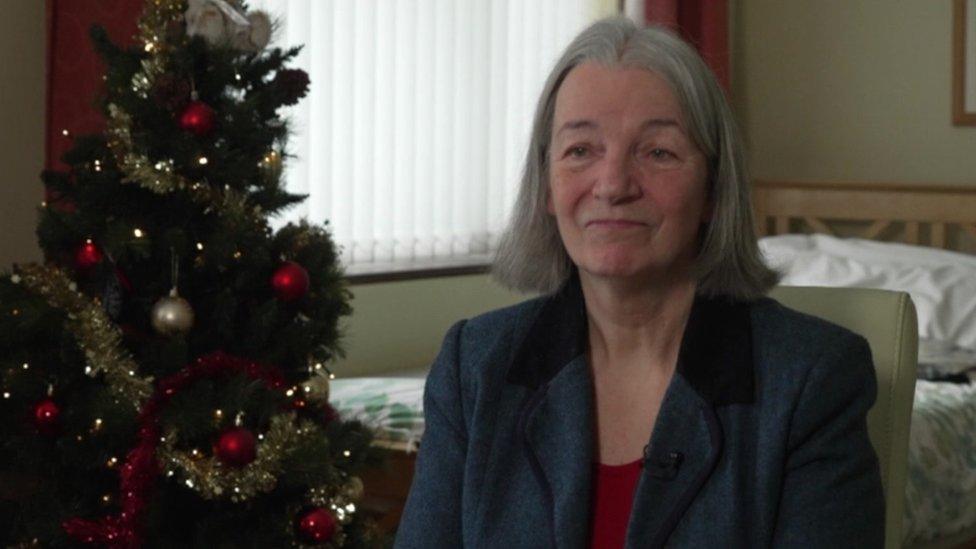
Sally Knight had appointments cancelled twice because of industrial action by doctors
Sally Knight started feeling pain in her hip at the start of 2023.
It was decided the 69-year-old needed a hip replacement - but after having two appointments cancelled because of strike action and being told the wait could be a year, she decided to pay to have the surgery privately. It cost her more than £13,000.
Ms Knight said she had felt she had no choice - the pain had been affecting her daily life.
"I feel really frustrated because I've worked all my life and paid my dues," she said.
"Yes the help is there - but you have to wait a very long time. I feel very let down."

Sir Julian Hartley, chief executive of NHS Providers, which represents health managers, said this set of strikes meant the "worst fears" of the health service were being realised.
"This is the last thing the NHS needs," he said. "The quality of care will be affected, with efforts to cut waiting lists further dented by these walkouts."
Dr Robert Laurenson and Dr Vivek Trivedi, who co-chair the BMA junior doctors committee, said they were "extremely disappointed" to be taking action again - the last walkout was in early October.
"We had hoped that after a much-improved tone and approach from the new health secretary, Victoria Atkins, we were close to a solution to this dispute," they said.
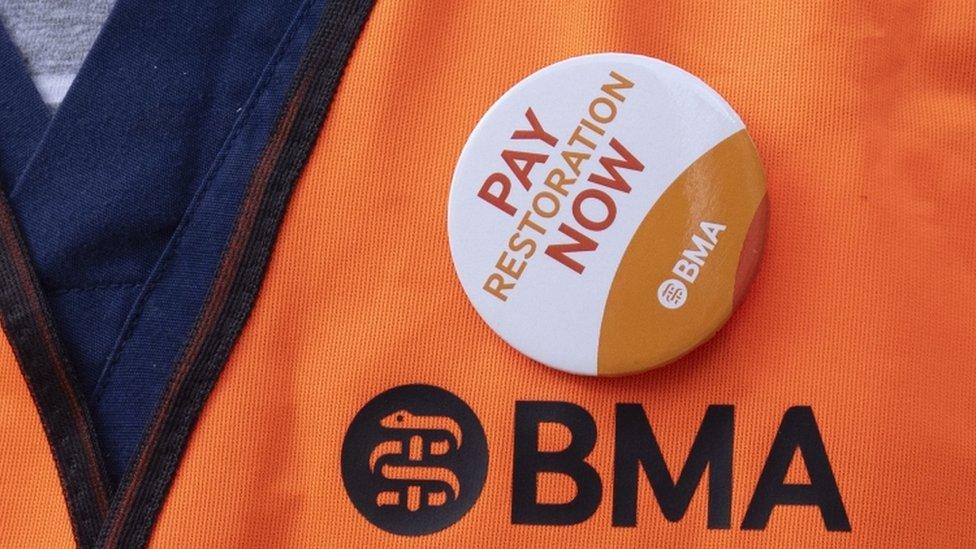
Dr Laurenson and Dr Trivedi urged the government to make a new offer - the BMA ended talks after setting a deadline of early December for a resolution.
An offer of a pay rise averaging 3%, from January, was being discussed, which would have been on top of the average of nearly 9% junior doctors received in April.
But the BMA said that was too little - junior doctors had asked for an extra 35%, to make up for below-inflation pay rises since 2008.
"After so many missed opportunities in 2023 to settle the dispute, surely now is the moment to conclude that everyone's time would be saved by cutting out unnecessary posturing," Dr Laurenson and Dr Trivedi said.
"Patients in need of care deserve nothing less."
Ms Atkins said the strikes would cause "significant disruption", despite contingency measures.
"My door remains open should the BMA cancel these disruptive strikes and come back to the negotiating table, as we were making good progress," she added.
Industrial action in the NHS in England, which began last December with walkouts by ambulance staff and nurses, is estimated to have cost more than £2bn in planning, preparations and paying for cover.
A pay offer to NHS staff other than doctors was accepted in May, while strike action by consultants has been put on hold as they vote on a fresh offer from the government.
This week, it was announced junior doctors in Wales would strike in January.

Are you a doctor on the picket line? Are you choosing not to strike? Are you a patient affected? Share your experiences by emailing haveyoursay@bbc.co.uk, external.
Please include a contact number if you are willing to speak to a BBC journalist. You can also get in touch in the following ways:
WhatsApp: +44 7756 165803
Tweet: @BBC_HaveYourSay, external
Please read our terms & conditions and privacy policy
If you are reading this page and can't see the form you will need to visit the mobile version of the BBC website to submit your question or comment or you can email us at HaveYourSay@bbc.co.uk, external. Please include your name, age and location with any submission.
- Published27 November 2023
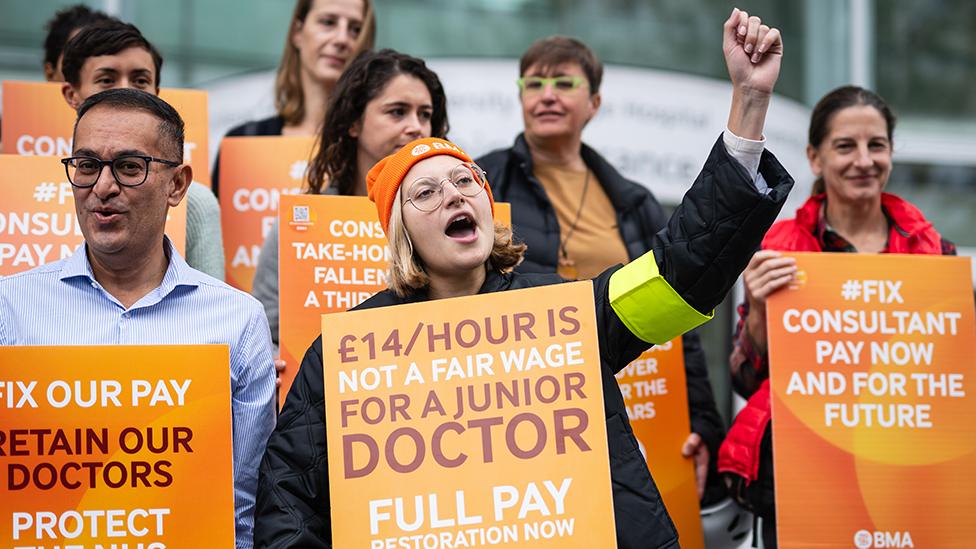
- Published28 November 2023
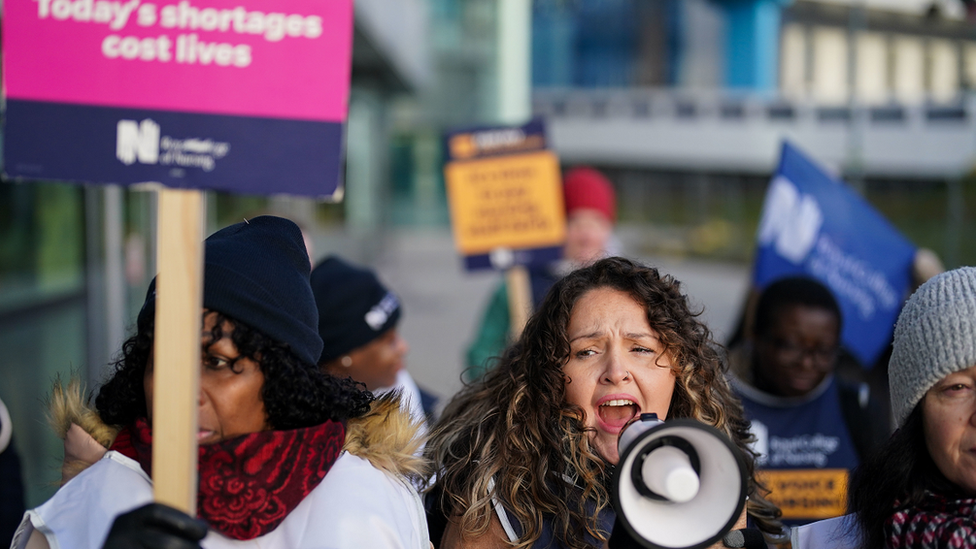
- Published2 May 2023
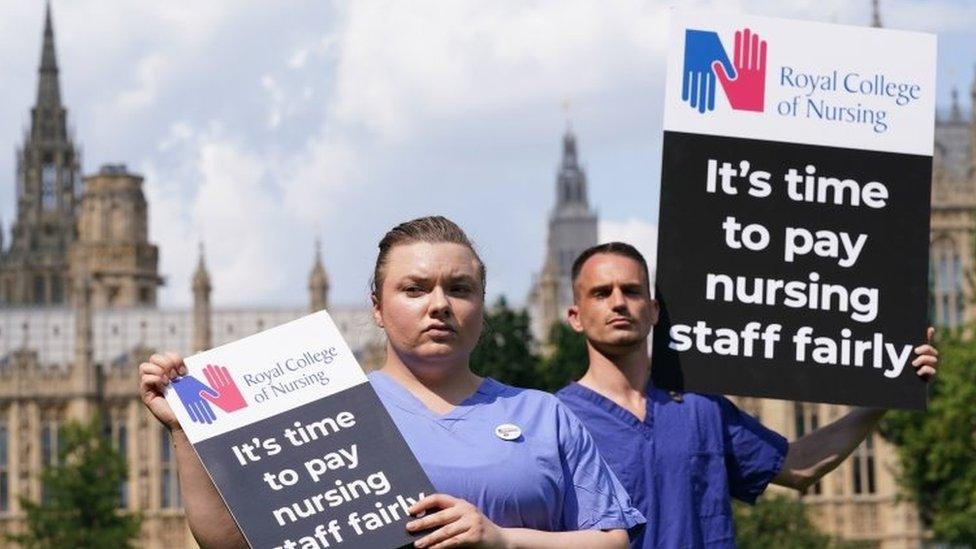
- Published9 August 2023
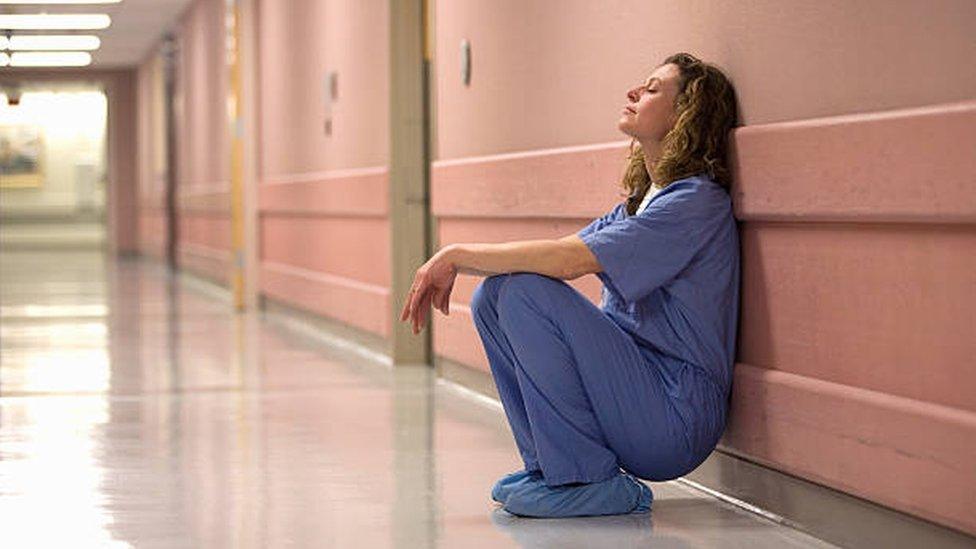
- Published2 May 2023
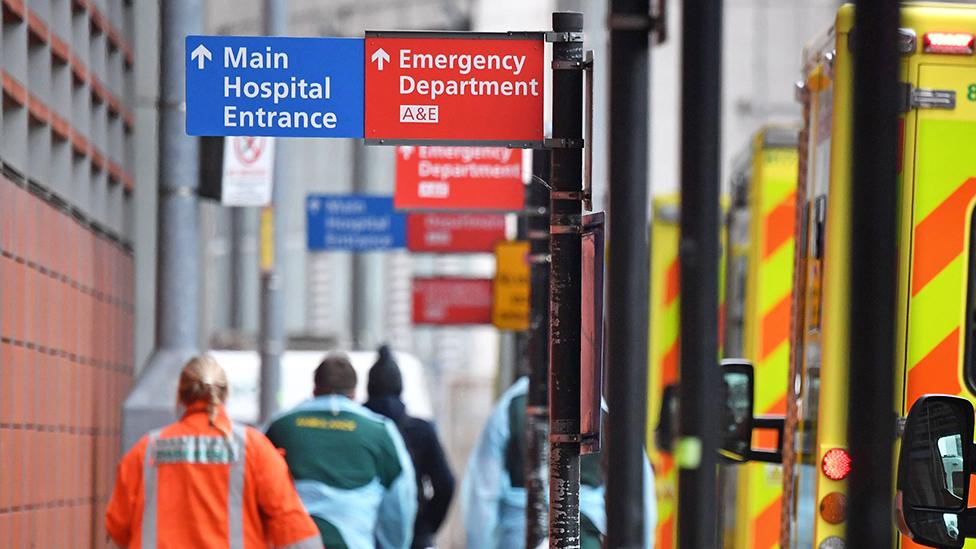
- Published21 July 2023

- Published11 August 2023
